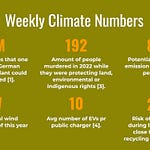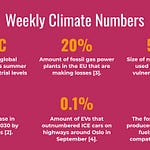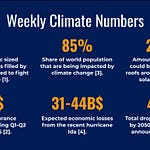Welcome to this week’s edition of The Weekly Climate 🎉
References: [1], [2], [3], [4], [5] and [6].
I’m very proud to report that I managed to get out and run 4 times last week totaling a whopping 13.6km 😎. Which is the first time in more than 1.5 years that I managed to do that. And I feel very motivated about it — probably the endorphins 😅. If you’re a runner or consider taking up running then I have a climate change reason for why you should get out right now. The UN and Strava (sports app) have launched #thehumanrace which aims to get as many people as possible to commit 100 minutes of total exercise time during the period of Aug 16-31 to show the world leaders that solidarity with the Global South is of paramount importance and that the Global North must follow through on their 100B$ commitment in climate mitigation and adaptation support (here’s a direct link to the challenge in Strava). Let me know if you’re around Copenhagen, Denmark and want to go on a run (albeit a slow on if with me) against the climate crisis!
‼️News you can’t miss
Here’s one important scary/bad (🙀), good (😻), interesting (😼) and fossil (💩) news item.
🙀 The Gulf Stream is showing signs of shutting down.
😼 Close to worst case answer for how long it takes for your rooftop solar panels to reach break-even: 7.2 years.
💩 Boulder, Colorado wants big fossil to pick up the bill for infrastructure expenses in the coming decades.
👩⚕️ Status: Climate & Science
Let’s look at how we’re doing this week!
[#gulfstream] — A new study concludes that the Gulf Stream (which have a huge impact on how liveable climate) is showing warnings of shutting down. If it did that it seems likely that the monsoon in Asia would be disrupted, Europe would be much colder and sea level rise in North America, just to mention a few effects. This cannot be allowed to happen. Maybe this is the “ozone layer” moment in climate science. Somehow the world’s politicians managed to fix that one because every one could imagine being scorched by the sun, maybe this is single event exacerbated by climate change that can unite the world?
[#siberia] — A new study has found that the Siberian heatwave last year did increase methane emissions from melting permafrost. But not by much. Temperatures last year in Siberia reached in many places 6C above normal, which caused some of the methane from the permafrost to enter the atmosphere.
[#attribution] — Here’s a nerdy look at so called attribution science, which looks at how humans impacting extreme weather events and whether a certain event can be attributed to climate change.
[#temperature] — July 2021 was the 3rd hottest globally and very close to 2020, making July 2020 and July 2021 the joint 3rd hottest July’s globally. Only July 2019 and 2016 was hotter.
📰 The 7 Grand Challenges
⚡️Decarbonize Electricity
Clean electricity is the one do-or-die challenge we must solve.
[#rooftopsolar] — A lovely post on how long it takes for solar panels to pay for themselves in a close to worst case situation: The author lives in Denmark (cold, overcast and rainy 6 months of the year) and where energy prices are through the roof except when you sell surplus electricity in which case you’re being paid 13% of what you buy 1 KWh for. And the answer: 12 years. IF you bought the panels 10 years ago. Now you can get a similar setup as what he has (4KW output) for 60% of the price. So expect around 7 years in a close to worst case country. And if you’re pumped about that you might take a look at Patagonia’s new movie “We the power” about community-driven electricity projects.
[#spacesolar] — A massive moonshot (or spaceshot?) project has received a donation of 100M$ to create satellites that harvest power of the sun and beam it back the Earth. Exciting, but also a moonshot.
[#energytransition] — Here are 3 graphs that shows how the energy transition is going in the US. Iowa, Oklahoma and Kansas are the 3 states that produce the most GW of renewable electricity. Where Texas, Missouri and West Virginia are the states that produce the most coal power, but which have also seen some of the largest drops in coal power production.
[#satellites] — A new partnership between IRENA and ESA aims to make satellite data more useable for planning the deployment of renewables. The data can be used to map suitable spots for deploying renewable energy on the Earth and to forecast production.
🏘 Reduce impact of urban and rural areas
Lowering the impact of urban and rural areas.
[#plantmetal] — My mind was completely blown by this. Did you know that plants can be used to make metals?! I certainly didn’t. But plants known as “hyperaccumulators” can actually be transformed by heating into a form of “bio-ore” which contains metals. For a small project in Malaysia, about 25% of the mass of the plants in the project is pure nickel. There are about 700 known species of hyperaccumulators. The process is known as phytomining and have been studied since the 80s.
[#bikes] — Here’s some disruption for you (I don’t know why but I still cringe at the word disrupt, maybe a work injury for being too much in the startup environment): A new study has found that electric cargo bikes deliver packets 60% faster than vans and reduce their carbon footprint by 90%. Boom. No reason at all for anybody running a shipping company to buy a van ever again.
[#recycling] — A bit of an interesting lawsuit popped up last week against recycling startup TerraCycle. The company is helping customers and companies around the world recycle very hard to recycle stuff like cigarette butts and candy wrappers. The way they do it is that as a consumer you sign up and get a box for each of the hard-to-recycle items which you then mail back (causing CO2 emissions) to TerraCycle. It sounds good, but the lawsuits states that the program is hard to follow for consumers as well as spreads doubt about whether the was are actually recycled. If the latter is true then obviously TerraCycle is doing nothing more than greenwashing for the big plastic polluters of the world.
[#remotework] — With COVID came a wave of remote workers. Suddenly everybody had to work from home and most people liked it. Many large organisations have claimed that they will never go back to ordinary office working again. And if companies commit to having people work remotely fulltime, then that might be very good for the climate as this means that people will emit fewer emissions during transportation and they might even be home to use some of the power their solarcells are generating and so on. But a new study reveals that the hybrid model which most companies seem to be adopting (in which people switch between working from home and at the office) is worse than working fulltime at the office because now the company still need to run a full office 24/7. So they don’t get the energy or the transportation emission savings
🌳 Protect and grow nature
Nature is our ally, we must protect it and help it help us.
[#rewilding] — Here’s a good one. A death metal baron in Ireland is leading the most ambitious rewilding project in EU. His 650 hectare land is completely overgrown to the delight of insects, birds and other plant species. Sounds amazing.
[#wildfire] — Turkey, Greece, Italy and Bosnia are all heavily affected by wildfires due to powerful heatwave over the area causing temperatures between 40-43C in many places. Turkey is particularly hard hit by wildfires and this image of a small boy watching a firefighter plane on the beach went viral last week. It’s also getting really really bad in Greece, where wildfires are approaching Athens causing thousands to flee. But wildfires are not exactly silent in the US either. The Dixie Fire which is the 6th largest ever in California has just engulfed the town of Greenville. If you want to see what wildfire destruction looks like take a look at this article. On the good side of US wildfires, it seems that fire fighters have made progress against some of the larger one’s last week. In particular the Bootleg Fire is now 84% contained. And if you think this year is worse than other years in terms of wildfires, you would be right. This July was the worst since satellites began mapping wildfires. An estimated 343Mt of carbon (that’s roughly 1Gt CO2) has been released into the atmosphere.
[#arctic] — One of the last orders that Trump manages to out was the selling of leases to drill for oil and gas in the Arctic Wildlife Refuge. But the Biden adminstration has found serious flaws in the impact review made during the Trump administration.
🍽 Optimize food
Without the lower impact of food or drink the hero doesn’t work (modified old danish proverb).
[#vegancheese] — One of the hardest products for me to survive without is cheese. So it’s good that people like the “Queen of vegan cheese” is working hard on solving that problem. She’s making cheese from sources such as nut milk. Vegan cheese is expected to grow 71% between 2019 and 2027.
[#water] — What’s the impact on natural resources when comparing tap water and bottle water? 3500 times. Resource extraction (water, oil etc) to make the bottled water is 3500 more expensive than tap water. In the US 17million barrels of oil will have to be extracted every year to meet the demand for plastic in plastic bottles.
[#drought] — Water scarcity on US West Coast is making lives extremely hard for farmers there. Due to the drought the federal government cut off water supplies to farmers in May. It’s the first time this has happened in more than a century.
[#microbialprotein] — Care for a microbial protein burger? Microbial proteins appear to be the new hot stuff in food tech. A couple of recent studies looked at how direct air capture and solar power can be used to make microbial protein which can be turned into animal feed or even for human consumption. But a few roadblocks are in the way.
⚖️ Climate Justice
Without justice there’s no future.
[#foodsecurity] — Oxfam have released a new report which concludes that governments and businesses drive to offset emissions by planting trees must be more careful in selecting where those trees are planting as they present evidence that tree planting in the global south may be displacing food production and thus threaten food security. They estimate that food prices could increase by as much as 80% by 2050 if offsetting by tree planting in the global south continue.
📦 Other / catch-all
All the other stuff that I couldn’t fit into any of the other categories, than the other category.
[#emoji] — Ok now we’re in the lighter category of problems here, but stil, here goes: While there’s a oil barrel, a petrol pump and a polluting factory there’s still no emojis for wind turbines. A group tried to submit one but it got rejected. The Unicode Consortium who decides such things didn’t reply to request for comment from the authors of the article. So I guess until it gets approved we just have to stick to the lollipop 🍭.
[#tech] — Tony Seba’s think tank RethinkX have released a new report in which it promotes 8 technologies that are available today, but which should be supported heavily by public and private funding in order to get us to netzero. These are solar, wind, batteries, autonomous transportation, electric vehicles, transportation-as-a-service, precision fermentation and cellular agriculture. It primarily focusses on three sectors: Energy, transportation and food. And sure those are big part of the pie, and here’s a what-aboutism alert (but they are important with blunt statements like this) but what about cement, steel, not to mention everything about climate justice and carbon removal just to mention a few obvious one’s which are missing.
[#netzero] — This is a great article that calls bullshit on all the net zero talk. It uses a lot of data to show that net-zero is ultimately a form of greenwashing. Which, until proven otherwise, I agree on (as you know). However! He also argues that despite all that, it has managed to achieve a few good things. Highly recommended read for this week.
[#venturecapital] — Greentech Media’s Energy Gang 🎧 talks with Powerhouse CEO Emily Kirsch about the venture capital market’s renewed current love affair with climate-tech.
⭐️Special Topics
🎩 Global and local policy
We have a special interest in covering the major global and local policies regarding climate, whether good or bad.
[#US] — The US just passed its big bipartisan 1T$ infrastructure bill and while it’s definitely lacking in some places it does (if nothing else) signal that both parties are now acknowledging that climate change is a crisis and that we will need a lot of money to solve it. This post has the details about the contents. A few things to highlight: (1) the bill does direct a huge amount of money towards climate resilience, (2) a tightening of vehicle emission standards should help phase out ICE cars, (3) setting a target of 50% of all cars sold should be EVs by 2030 and finally, (4) a focus on nuclear, carbon capture and electricity transmission. Must admit that I was pleasantly surprised to see nuclear as one of the focus areas…
[#degrowth] — Here’s an interesting and quite well researched piece (although it seems to accept some quite contested “facts” such as the fact that western world are decoupling) about degrowth. Degrowth is a movement that is gaining traction and essentially concludes that to solve the climate crisis world must stop focus on growing GDP and start focusing on degrowing GDP to limit emissions. I don’t think that there’s any doubt that if GDP went to zero in all countries that we would emit less. So degrowth is certainly ONE solution to the climate crisis. But is it the solution we want? The article argues that no it’s not.
🛡 Adaptation
Adapting our civilization to the coming climate crisis is vital. Here we cover various ways that is happening (or isn’t).
[#flooding] — A new study looks at global flood impacts from 2000 to 2018. In that period between 250 and 290 million people were affected by flooding. This number is expected to increase by 10x in the coming decade due to growth in population those areas. The study found that areas with flood impact have a population growth of 34% compared to 18% as the global average. This seems to indicate that more and more people are moving into flood prone areas, which is obviously not a good move.
[#china] — And related.. Death toll from China’s flooding a week or so back has increased to over 300, which is more than 3x the previously stated number.
⛽️ Major Carbon Emitters
We have a special interest in covering the moving of the major carbon emitters as these are the key roadblock to climate action.
[#infrastructure] — Boulder, Colorado has calculated that taxpayers will need to pay 100M$ over the next decades in order for the city to adapt to climate change. And it’s not going to have taxpayers foot that bill. No it has sued the oil majors for having to use a fairshare of their “vast profits” to pay for the damage they’re causing. This one will be interesting to follow as it could create a ripple effect of precedence if won.
[#exxon] — Exxon was kicked out of the Climate Leadership Council a group that (by this move at least) appear to be working on getting a carbon tax approved. This probably has something to do with Greenpeaces “fake job interview” from a few weeks back. They might be trying to do some more greenwashing with as it looks like they’re joining the climate pledge bandwagon any time soon. According to WSJ Exxon is considering to make a climate pledge for 2050. Targets they don’t cost a thing (as a fantastic rockabilly band from North Carolina once sang.. almost).
[#shellmuseum] — Remember that Shell sponsored carbon capture exhibition in the Museum of London called “Our Future Planet”? The exhibition itself is scandalous primarily because the Museum has allowed Shell to get a clear avenue to greenwash and hereby influence the thousands of citizens who may go there unknowingly. It’s a disgrace. But what’s more a disgrace is that upon signing the sponsorship the museum also signed away the rights to say anything discrediting about Shell.
That’s it for this week folks!
Remember if you’re feeling down, angry or sad from some of the news in this newsletter one cure is to act. And one way you can always act that also happens to be one of the most powerful things you can do is to talk about it. That also works if what you just read made you hopeful or happy btw.
If you enjoyed this newsletter don’t forget to share it with your friends, coworkers or other people you think could benefit from getting it. If you got directed here by a friend or another link on the Internet don’t forget to subscribe!
See you all next week 👋












